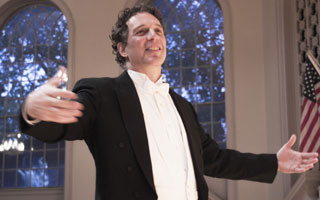
Fauré and Vaughan Williams: Saturday, May 13th, 7:30pm, Norwalk Concert Hall, Norwalk, CT
Gabriel Fauré’s Requiem and Ralph Vaughan Williams’ Dona Nobis Pacem (Grant Us Peace)close the Fairfield County Chorale's 2016-2017 season on Saturday, May 13th, 7:30pm at Norwalk Concert Hall. The pairing of these two highly emotional works welcomes spring with a message of hope. The concert will be conducted by the Chorale's Music Director, David Rosenmeyer and features soloists Larisa Martinez, soprano and Philip Kalmanovitch, baritone. Tickets are $30 in advance, $35 at the door and $5 for students.
Of all the sacred works of the late 19th century, none is more beloved than Fauré's Requiem.
It is revered for the beauty of its harmonic language, based on plainchant and modal writing, and the gentleness in the shimmering "Sanctus" and the cradle-like rocking of the "Pie Jesu" and "In Paradisum.” Fauré's gentle Requiem feels like a new kind of liturgy.
The composer himself wrote, “I have instinctively sought to escape from what is thought right and proper ... I wanted to write something different.”
Written in 1888, it is speculated that Fauré's brief yet devastating experience of active service in the Franco-Prussian War influenced the work. Fauré’s God is forgiving; the feeling of mercy is expressed through the impressionistic music. It was the words "quia pius es" (for thou art merciful) that meant the most to the composer, according to Fauré's son, Philippe Fauré-Fremiet.
“In 1936 Vaughan Williams took even more liberties with the requiem form,” said David Rosenmeyer.
“The phrase “dona nobis pacem”(grant us peace), is taken from the “Agnus Dei” portion of the Catholic Mass. This litany usually comes at the end of the ordinary Mass. Vaughan Williams takes the phrase out of context and uses it as a recurring refrain for emphasis in this harmonious work,” continues Rosenmeyer.
Vaughan Williams wrote “Dona Nobis Pacem” in1936 when memories of the loss of a generation of young men were fresh in everyone's minds amid fears of a new war. And like Fauré, Vaughan Williams saw firsthand the destructive nature of war and believed music was a means to preserve civilization. Vaughan Williams' texts were taken from the Mass, three poems by Walt Whitman, written after Whitman experienced the carnage of the American Civil war, a political speech, and sections of the Bible.
The cantata opens with a soprano solo, quickly joined by the chorus in a fervent cry for peace. The answer: distant drums — a harbinger of war.
“Repetitions of the phrase “and on earth peace, goodwill toward men” ring with celebratory optimism. In the last movement, Vaughan Williams compiles a number of wise biblical sayings urging communal action for peace. Only the soprano soloist’s “dona nobis pacem” floating hauntingly overhead sounds a warning that we must heed, lest we revert and again sacrifice righteousness and peace to war.” *
With Dona Nobis Pacem, Vaughan Williams universalizes a heartrending plea for peace.
Tickets are $30 in advance and $35 at the door and $5 for students. Group rates are available on request. Tickets are available from Chorale members, on the FCC website, by mail, or by phone. (203)-858-3713. 606 Post Road East # 705, Westport, CT 06880
To purchase tickets online or for more information, please visit the Chorale’s website at fairfieldcountychorale.org. Please visit: facebook.com/fairfieldcountychorale